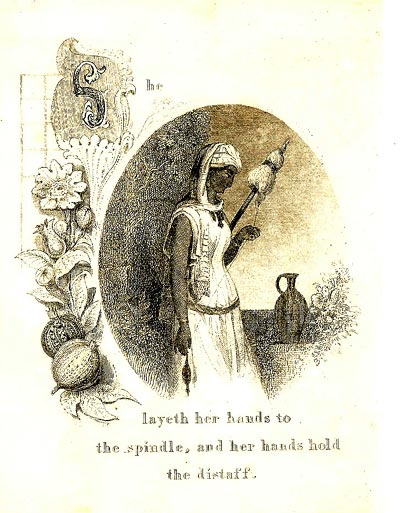
























SHE LAYETH HER HANDS TO THE SPINDLE,
AND HER HANDS HOLD THE DISTAFF.

Had not the sacred writer further enlarged upon the character of this woman, had this single praise been uttered of her, it would, to those for whom it was immediately intended, be of itself a high commendation. The Rabbins record an old saying of the Hebrews, that there is no wisdom in a woman but in the distaff; implying, as do the words of the text, that a woman's great praise is her industry. The Greeks and Romans would have accorded fully with the implied sentiment. When a Roman lady became a bride, she received many a hint from the marriage ceremony, that she was about to enter on active domestic employment; and again and again, the word thalassio resounded on her ear. This word, which signified the vessel in which were kept the materials for spinning, and the work already spun, reminded her, not only of the spindle and the distaff, to which it might directly refer, but was also significant of the various household occupations, in which the women of ancient days felt it their duty and their honour to excel.
In those old times,
There was far less of gadding, and far more
Of home‐born, heart‐felt comfort, rooted strong
In industry, and bearing such rare fruit
As wealth might never purchase."
It was not until the more degenerate days of Rome, when luxury had supplanted the habits of the older state of society, that spinning and weaving were left to the slave. In earlier times, the bride went to her new home amid the throng of rejoicing maidens; and the young attendants carried in their hands the distaff and the spindle, with the gay‐coloured wools hanging about them;-to all it spoke the same lesson-the lesson so often inculcated by the Roman writers, that a woman should resemble the bee for industry, and imitate Minerva, whose wisdom was so truly womanly in its direction, that she was said to be the first who ever wrought a web.
It was the pride of Augustus Caesar, that his imperial robes, his fringed tunic, and costly girdle, were wrought in his household, by the hands of his wife, his sister, his daughter, and his grand‐daughters. So, too, Alexander the Great, when advising the mother of Darius to teach her nieces to imitate the Grecian ladies in spinning wool, showed her the garments which he wore, and told her they were made by his sisters. The virtuous Lucretia worked with her maidens at the spinning‐wheel; and Tanaquil, the wife of Tarquin, wrought woollen robes so well, that long after her death, her spinning implements, together with a robe of her manufacture, were hung up in the Temple of Fortune; a constant monument of her taste and skill, and an intimation to Roman maids and matrons, that they, too, should lay their hands to the spindle, and their hands should hold the distaff.
The Jewish Scriptures so frequently refer to the industry of women in occupations of this kind, that one can easily imagine the matron,
"At her wheel.
Spinning amain, as if to overtake
The never‐halting time; or, in her turn,
Teaching some novice of the sisterhood
Her skill in this or other household work."
The ancient spindle or spinning‐wheel was held by the right hand, and turned round, while the distaff or staff around which the wool was rolled was held in the bend of the left arm, and the thread drawn over the fingers of the left hand, so that both hands were employed.
The spindle and the distaff are the most ancient form of the spinning apparatus, and, in an improved condition, were long used even in our own country; hence the word spinster; and the English maiden or mother might often be seen sitting at her wheel
In summer, ere the mower was abroad
Among the dewy grass-in early spring,
Ere the last star had vanished."
But time has brought its wondrous improvements and great changes, and the well‐constructed spinning machinery of modern days has banished from our cottage‐doors the busy hum of the wheel. The cottager who once turned it gaily round, has now to change her mode of industry, and has only to make up with her needle, into garments, the fabric which she would once have manufactured for herself.
But besides the actual spinning or weaving of the wool and flax, the preparation of these substances gave much employment to the Jewish household. The flax required drying and preparing for use. The wool, after being combed, and picked, and carded, was put up, in round balls, ready for the spindle. It was sometimes left for use with the natural moisture which fresh‐cut wool always yields, and which reminds us of the wool of Gideon's fleeces, out of which, in the Syrian climate, he could wring dew, "even a bowl full of water" (Jdg 6:38). Wool in this state was called plump‐wool; but when the manufacturers were about to make some, of those brilliant garments, whose tints no modern skill can furnish, the wool had to be subjected to the various processes of dyeing. In this case it was usual to anoint the wool with wine, or with some unctuous substance, preparatory to plunging it into the dye.
The Blue Letter Bible ministry and the BLB Institute hold to the historical, conservative Christian faith, which includes a firm belief in the inerrancy of Scripture. Since the text and audio content provided by BLB represent a range of evangelical traditions, all of the ideas and principles conveyed in the resource materials are not necessarily affirmed, in total, by this ministry.
Loading
Loading
| Interlinear |
| Bibles |
| Cross-Refs |
| Commentaries |
| Dictionaries |
| Miscellaneous |
